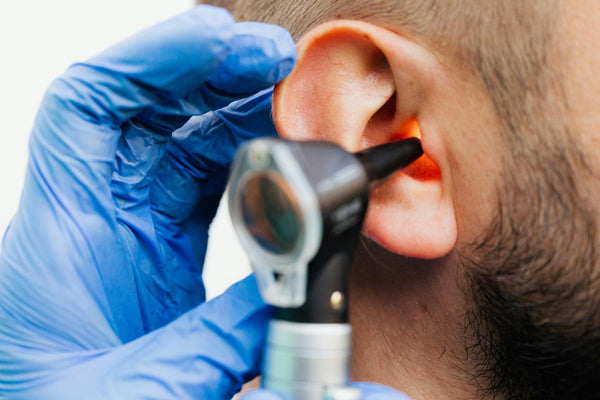
A feeling of fullness, muffled hearing, or a bubbling sound inside your ear can sometimes mean there’s fluid trapped behind the eardrum. This can happen for a variety of reasons - from water getting stuck after swimming, to inflammation or fluid build-up behind the eardrum. In most cases, it’s temporary and harmless, but if it lingers or causes discomfort, it may need professional attention.
At Leightons, our audiologists can help determine what’s causing the problem and provide safe, effective solutions for clearer, more comfortable hearing.
What is fluid in the ear?
“Fluid in the ear” can refer to two main types of issues:
- Outer ear fluid (in the ear canal): Often caused by trapped water, ear wax, or an outer ear infection (otitis externa). This is the type people might experience after swimming or showering.
- Middle ear fluid (behind the eardrum): Also known as middle ear effusion or glue ear, this happens when fluid collects in the space behind the eardrum, often due to infection or Eustachian tube dysfunction.
While both types can cause similar sensations of blockage or muffled hearing, the causes and treatments are different. A professional ear examination can identify which type you have and what needs to be done.
Common causes of fluid in the ear
Fluid in or behind the ear can result from several different factors:
- Water trapped in the ear canal: After swimming, bathing, or using earbuds.
- Ear infections (otitis externa or otitis media): Infection can create fluid, discharge, or swelling.
- Eustachian tube dysfunction: When the tubes connecting the middle ear and throat are blocked, fluid can’t drain properly.
- Colds, allergies or sinus congestion: Can lead to inflammation and pressure changes.
- Glue ear: A chronic condition where thick fluid builds up behind the eardrum, common after repeated infections.
- Pressure changes: Flying or diving can temporarily affect ear pressure and cause fluid movement.
Symptoms to watch for
Fluid in the ear can feel different depending on where it sits and how much there is. Common symptoms include:
- A feeling of fullness or blockage in one or both ears
- Muffled or reduced hearing
- Popping, crackling or bubbling sounds
- Itching, irritation or mild pain
- Drainage or discharge (in the case of infection)
- Balance problems or dizziness
If these symptoms persist for more than a few days, or are accompanied by pain or discharge, it’s best to see an audiologist or GP.
Is fluid in the ear serious?
In most cases, fluid in the ear will clear naturally once the underlying cause (like trapped water or congestion) resolves. However, persistent fluid, especially behind the eardrum, can lead to temporary hearing loss or recurring infections if left untreated.
For children, long-term fluid in the middle ear can sometimes affect hearing and speech development - so early assessment is important.
How to treat fluid in the ear
Treatment depends on whether the fluid is in the outer or middle ear.
For outer ear fluid:
- Tilt your head or gently pull on your earlobe to help water drain.
- Avoid inserting cotton buds or objects into the ear.
- If symptoms persist, professional cleaning or drops may be needed to treat infection or inflammation.
For middle ear fluid:
- Observation: Mild cases often resolve naturally.
- Decongestants or nasal sprays: To be used with guidance from a GP or pharmacist, it helps open the Eustachian tubes for drainage.
- Antibiotics: Used if the fluid is linked to an infection.
- ENT referral: In chronic cases (like glue ear), a specialist may recommend minor drainage procedures.
Leightons’ audiologists can carry out safe ear examinations and hearing assessments to identify the cause and guide you to the most appropriate treatment.
How Leightons can help
Our expert audiologists combine advanced diagnostic technology with a caring, personal approach. During your visit, we can:
- Examine your ears safely to see where the fluid is located
- Remove ear wax or debris if needed
- Check for infection or inflammation
- Carry out a free hearing test to measure any hearing impact
- Recommend the next steps for treatment or referral if required
You’ll leave with a clear understanding of what’s happening and the best way forward for your ear health.
Preventing fluid in the ear
A few small habits can reduce your risk of ear fluid or blockage:
- Dry the outer part of your ears after swimming or showering
- Avoid inserting cotton buds or foreign objects
- Manage colds and allergies promptly
- Yawn or swallow during flights and altitude changes
- Schedule regular ear health checks if you’re prone to congestion, infections, or wax build-up







